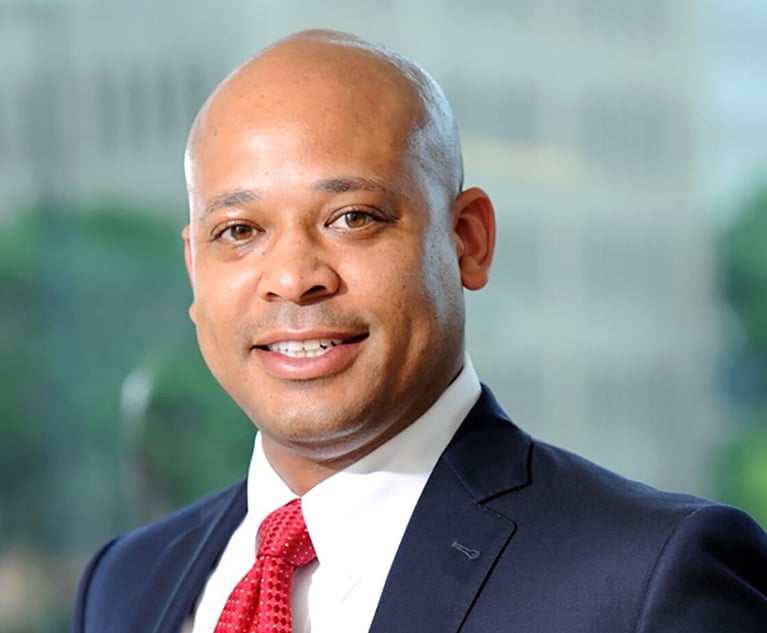 Shari Klevens (left) and Alanna Clair, Dentons. (Courtesy photo)
Shari Klevens (left) and Alanna Clair, Dentons. (Courtesy photo)The Seven Deadly Sins of Lawyers, No. 7: Envy
It can be tempting for attorneys to focus on what other attorneys are doing or to compare themselves against others in the field in a way that is destructive rather than motivating.
April 01, 2019 at 10:59 AM
6 minute read
This final installment of the series regarding the “Seven Deadly Sins of Lawyers” focuses on envy. As with some other topics in this series, envy can be the byproduct of the fast-paced nature of the modern law practice.
Indeed, the practice of law is a business and is also highly competitive. Attorneys develop reputations that are critical to their livelihood. For those attorneys whose compensation is directly tied to their ability to land clients or grow their practice, there can be immense pressure to keep up with others.
It can be tempting for attorneys to focus on what other attorneys are doing or to compare themselves against others in the field in a way that is destructive rather than motivating. To quote the Greek philosopher Heraclitus: “Our envy always lasts longer than the happiness of those we envy.” Here are tips for ways attorneys can avoid letting feelings of envy or professional jealousy create ethical risk.
Don't Covet Thy Neighbor's Clients
As noted above, the practice of law is a competitive business. However, there are restrictions regarding an attorney's ability to interfere in or to attempt to disrupt an attorney-client relationship to which the attorney is not a party.
Rule 4.2 of the Model Rules of Professional Conduct provides: “In representing a client, a lawyer shall not communicate about the subject of the representation with a person the lawyer knows to be represented by another lawyer in the matter, unless the lawyer has the consent of the other lawyer or is authorized to do so by law or a court order.” The comments to the rule suggest that this restriction on contacting or speaking to represented parties exists even if the represented person consents to the communication.
This rule recognizes the public interest, as reflected in the comments to Rule 4.2, in avoiding “overreaching by other lawyers who are participating in the matter” or interfering in the attorney-client relationship or the “uncounselled disclosure of information.” The comments expressly note that an attorney may have contact with a represented person “concerning matters outside the representation.”
Notably, the restriction on contacting represented persons attaches when the attorney is also representing an interested party in the same matter (“In representing a client”). Thus, the issue of whether an attorney can contact someone else's client is generally separate and distinct from the issue of providing pitch materials or other information about legal services to a client. Attorneys are generally permitted to pitch their services to clients who have other attorneys representing them (subject to the rules on advertising, which are also pervasive). Indeed, it is not uncommon for a client to seek pitches from new law firms for existing work, even where there are already attorneys in place.
Notwithstanding this, there can still be risks for attorneys who go after other attorneys' clients, namely that it may run afoul of other direct solicitation restrictions in the ethical rules. Some states have even considered tort liability against an attorney for interfering in another attorney's relationship (although such claims are difficult to prove). However, by keeping the various limitations in mind, attorneys can avoid having their envy of another's client relationship create risk.
Risk of Interfering With Partnership's Business
In generations past, it was not uncommon for an attorney in private practice to stay with the same firm for an entire career. However, as competition increases—both within the legal profession and in support of attorneys—it is much more commonplace for attorneys to move between firms, sometimes several times during the course of a career.
The rules of professional conduct are clear that an agreement that “restricts the right of a lawyer to practice after termination of the relationship” is disfavored. Model Rule 5.6(a). Generally speaking, this means that a firm cannot place restrictions on an attorney's right to practice after leaving the firm. Many states view this as an issue of ensuring that clients can choose the lawyers they want without anti-competitive restrictions.
However, for partners leaving law firms, partnership law and the partnership agreement itself may govern what a partner is and is not permitted to do upon leaving a firm. Indeed, just because firms may not “restrict the right of a lawyer to practice,” lawyers are similarly generally not permitted to breach their fiduciary duties owed to their firm upon leaving.
For example, it could be a breach of the partner's fiduciary duty to interfere with the firm's ability to service its clients or to maintain staff while still a partner. Indeed, even where a partner has decided to leave a firm, the partner still is often required to keep emotions in check and avoid harming the interests of the law firm partnership.
Clients can decide to leave with departing partners—indeed, that is consistent with the public policy interest in ensuring clients have their choice of counsel—but partners of a firm often have separate obligations to their firm, even if they are on their way out the door. A partner who has bad feelings about the way things ended may create tort or other liability by targeting and coveting a partnership's other assets (including personnel or client relationships).
The Importance of Self-Care
It is not news that the profession is in the midst of a crisis with regard to mental illness, substance abuse and self-harm. In addition to the intense pressure that the practice of law can create for practitioners, the fixation on others or others' success can additionally add to the risks of the profession.
Sometimes, it is important for attorneys to “let go” of personal grievances or jealousies of others to help ensure that envy of another practitioner does not become all-consuming.
Shari L. Klevens is a partner at Dentons US in Atlanta and Washington, D.C., and serves on the firm's U.S. board of directors. She represents and advises lawyers and insurers on complex claims and is co-chair of Dentons' global insurance sector team.
Alanna Clair, also a partner at Dentons US in Washington, focuses on professional liability and insurance defense. Klevens and Clair are co-authors of “The Lawyer's Handbook: Ethics Compliance and Claim Avoidance” and the upcoming 2019 edition of “Georgia Legal Malpractice Law.”
|This content has been archived. It is available through our partners, LexisNexis® and Bloomberg Law.
To view this content, please continue to their sites.
Not a Lexis Subscriber?
Subscribe Now
Not a Bloomberg Law Subscriber?
Subscribe Now
NOT FOR REPRINT
© 2024 ALM Global, LLC, All Rights Reserved. Request academic re-use from www.copyright.com. All other uses, submit a request to [email protected]. For more information visit Asset & Logo Licensing.
You Might Like
View All
Business Breakups: Why Business and Commercial Cases Are Well-Suited to Mediation
5 minute read

In RE: Hair Relaxer Marketing, Sales Practices and Products Liability Litigation
Trending Stories
- 1'Water Cooler Discussions': US Judge Questions DOJ Request in Google Search Case
- 2Court rejects request to sideline San Jose State volleyball player on grounds she’s transgender
- 3Trump and Latin America: Lawyers Brace for US's Hardline Approach to Region
- 4Weil Advances 18 to Partner, Largest Class Since 2021
- 5People and Purpose: AbbVie's GC on Leading With Impact and Inspiring Change
Who Got The Work
Michael G. Bongiorno, Andrew Scott Dulberg and Elizabeth E. Driscoll from Wilmer Cutler Pickering Hale and Dorr have stepped in to represent Symbotic Inc., an A.I.-enabled technology platform that focuses on increasing supply chain efficiency, and other defendants in a pending shareholder derivative lawsuit. The case, filed Oct. 2 in Massachusetts District Court by the Brown Law Firm on behalf of Stephen Austen, accuses certain officers and directors of misleading investors in regard to Symbotic's potential for margin growth by failing to disclose that the company was not equipped to timely deploy its systems or manage expenses through project delays. The case, assigned to U.S. District Judge Nathaniel M. Gorton, is 1:24-cv-12522, Austen v. Cohen et al.
Who Got The Work
Edmund Polubinski and Marie Killmond of Davis Polk & Wardwell have entered appearances for data platform software development company MongoDB and other defendants in a pending shareholder derivative lawsuit. The action, filed Oct. 7 in New York Southern District Court by the Brown Law Firm, accuses the company's directors and/or officers of falsely expressing confidence in the company’s restructuring of its sales incentive plan and downplaying the severity of decreases in its upfront commitments. The case is 1:24-cv-07594, Roy v. Ittycheria et al.
Who Got The Work
Amy O. Bruchs and Kurt F. Ellison of Michael Best & Friedrich have entered appearances for Epic Systems Corp. in a pending employment discrimination lawsuit. The suit was filed Sept. 7 in Wisconsin Western District Court by Levine Eisberner LLC and Siri & Glimstad on behalf of a project manager who claims that he was wrongfully terminated after applying for a religious exemption to the defendant's COVID-19 vaccine mandate. The case, assigned to U.S. Magistrate Judge Anita Marie Boor, is 3:24-cv-00630, Secker, Nathan v. Epic Systems Corporation.
Who Got The Work
David X. Sullivan, Thomas J. Finn and Gregory A. Hall from McCarter & English have entered appearances for Sunrun Installation Services in a pending civil rights lawsuit. The complaint was filed Sept. 4 in Connecticut District Court by attorney Robert M. Berke on behalf of former employee George Edward Steins, who was arrested and charged with employing an unregistered home improvement salesperson. The complaint alleges that had Sunrun informed the Connecticut Department of Consumer Protection that the plaintiff's employment had ended in 2017 and that he no longer held Sunrun's home improvement contractor license, he would not have been hit with charges, which were dismissed in May 2024. The case, assigned to U.S. District Judge Jeffrey A. Meyer, is 3:24-cv-01423, Steins v. Sunrun, Inc. et al.
Who Got The Work
Greenberg Traurig shareholder Joshua L. Raskin has entered an appearance for boohoo.com UK Ltd. in a pending patent infringement lawsuit. The suit, filed Sept. 3 in Texas Eastern District Court by Rozier Hardt McDonough on behalf of Alto Dynamics, asserts five patents related to an online shopping platform. The case, assigned to U.S. District Judge Rodney Gilstrap, is 2:24-cv-00719, Alto Dynamics, LLC v. boohoo.com UK Limited.
Featured Firms
Law Offices of Gary Martin Hays & Associates, P.C.
(470) 294-1674
Law Offices of Mark E. Salomone
(857) 444-6468
Smith & Hassler
(713) 739-1250







